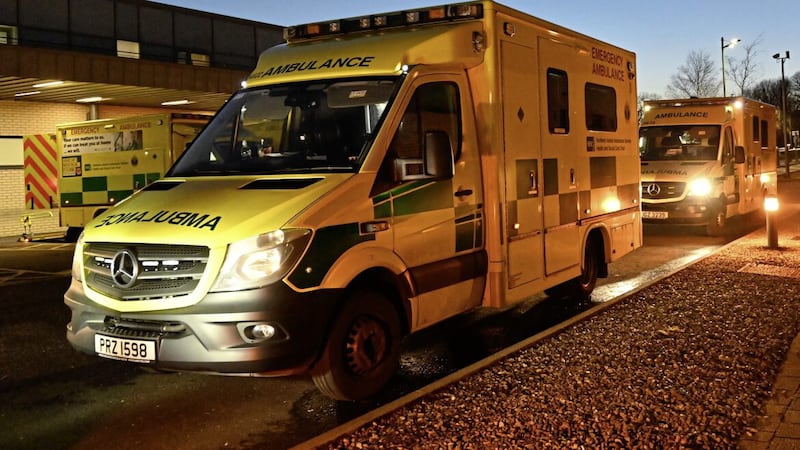There is an air of victim-blaming in appeals from the health service for patients to leave hospital.
“Ready to be discharged?” asks a statement from Health and Social Care Northern Ireland (HSCNI). “Please support our hospitals by helping free up beds during this extremely busy time.”
An accompanying leaflet uses the odd term “please step down”, as if people are clinging to beds refusing to get off.
When Antrim Area Hospital shut A&E last weekend, the Northern trust appealed “for the full co-operation of patients, families and carers in assisting us with discharging loved ones who are ready to go home”.
In July, Stormont’s Department of Health issued an “urgent appeal” to families of patients to “ensure there are arrangements in place for them to be picked up promptly on the day of discharge”.
Hospitals in England have experienced serious problems with so-called ‘bed blocking’, mainly by elderly patients with no care home or package in place. But social care in England is managed by councils, separately to the NHS. In Northern Ireland, uniquely in the UK, health and social care are integrated and have been for half a century - hence the title of the HSCNI, which is effectively the NHS management team inside the Department of Health. The Northern trust’s full title is the Northern Health and Social Care Trust. Antrim Area Hospital, like all hospitals in Northern Ireland, has social workers on site to arrange and approve onward care. When the health service here complains of patients not being discharged, it is largely complaining about itself.
A small number of families might cause delay and small numbers can still be critical to a system at breaking point. However, the overwhelming experience of patients and families is being keen to leave but forced to hang around.
Even a straightforward departure from hospital routinely takes hours, awaiting a clinician senior enough to sign you out. Obtaining medicines and medical equipment can be another protracted hurdle.
The ambulance service, which helps discharge patients, is overloaded due in part to delays at A&Es. While private ambulances are subcontracted for non-emergency transport, they are increasingly relied on for emergency cover, making them less dependable for home transfers.
When a patient has been gravely ill or received complex care, extracting them from hospital can be Kafkaesque. My father spent two months at the end of his life in Belfast City Hospital, after being brought from Craigavon for a test. No ambulance could be found on a weekend to take him back, then after a few more days it was too close to Christmas to try. We were happy with his treatment at the City but he was nevertheless stuck in the ‘wrong’ hospital, disrupting bed space allocation both there and in Craigavon, at least for the several days of initial confusion. There were further days of complication bringing him home.
Discharging a patient properly is important - it cannot be dismissed as mere bureaucracy. But it is the type of process where better management alone can make a dramatic difference. The paperwork is copious, the computers are ancient and there is no real communication with patients or families. Time is spent waiting for one professional to tour the wards, or two or more staff to meet. The institutional formalities would be recognisable to a nurse or doctor from the 1950s. A basic review of such processes - a time and motion study, to use a 1950s term - can always identify improvements. Research in Canada has shown hospital capacity can be increased by 70 per cent through straightforward changes to working practices.
The NHS does not drill down relentlessly on its processes because it is under-managed, contrary to popular belief. Only 5 per cent of its staff are managers - a third the level of the UK workforce overall. Due to the way the NHS was created, much of the day-to-day running of hospitals is left to medical consultants, who have neither the time nor the inclination to become management gurus. The conservative, status-driven culture of the medical profession also obstructs change.
As a result, the NHS tends to fire-fight problems with money. A waiting list may be reduced with extra spending then considered ‘solved’, yet none of its causes will have been addressed and may have been further entrenched.
The public has a responsibility to the health service and NHS managers might be as overworked as staff. But it is unacceptable to blame patients and families for problems the organisation itself will not confront.









